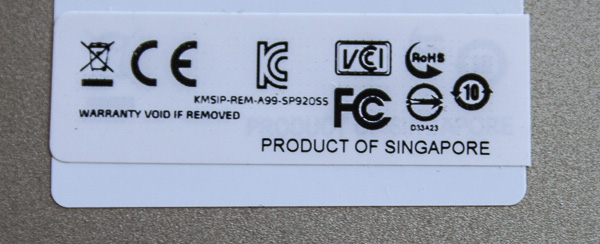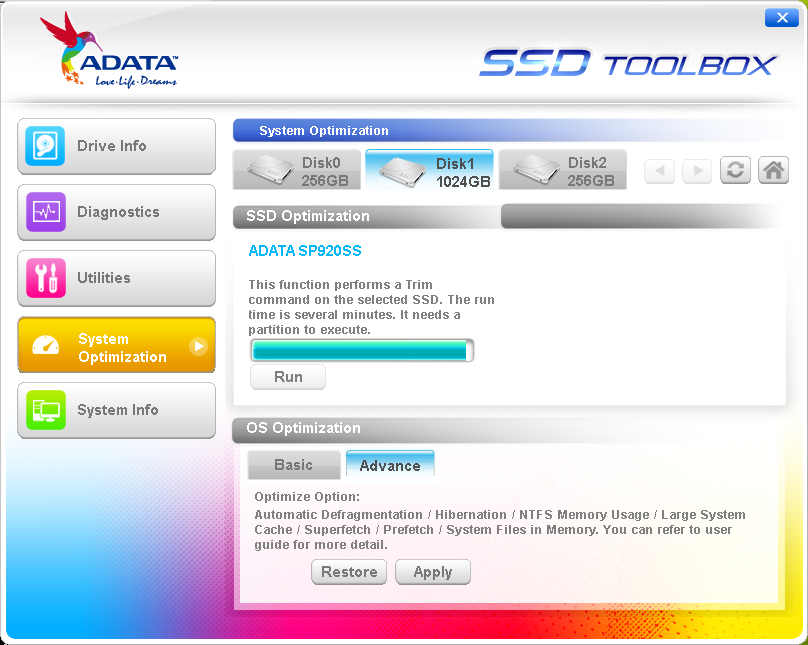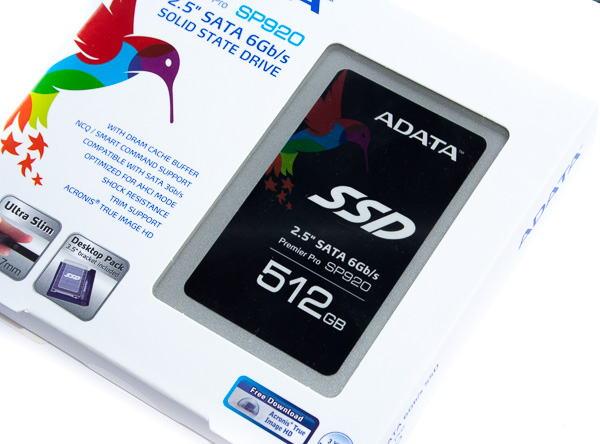Adata Premier Pro SP920 SSD: From 128 To 1024 GB, Reviewed
Adata shifts away from SandForce in its Premier Pro SP920 SSD family. With promises of incredible performance and spiffy features like DevSlp, Adata's latest employs the Marvell controller we saw in Crucial's M550. But the two share quite a bit more...
Adata SP920: Adding Value With A Nice Bundle
There are a couple of different directions I could go with this wrap-up. On one hand, it'd be easy to take a swipe at Adata for rebadging a Micron storage platform. But the fact of the matter is that I'd do the same thing in Adata's position. There are several companies needing a drive like the SP920 right now
Lots of companies need a drive like the SP920 that can tide them over until LSI's next-gen SandForce controller is ready. Adata had to look at its options and decide that it'd take too long to develop a home-grown Marvell-based platform. Going with a fast, modern, and, most important, available SSD like the M550 simply made the most sense. Adata gets a solid product able to soften the wait, and Micron (Crucial's parent company) gets to move more volume.
Neither Micron nor Adata wants to volunteer details, and legally, they're probably prohibited from doing so. But we can fill in the gaps with educated guesses. Adata had to know that we'd figure all of this out relatively quickly, so the company gets my respect for making this decision, sticking with it, and doing what's best until the next wave of SSDs is ready. If imitation is the sincerest form of flattery, then Adata is making quite a statement about the M550. And hopefully, a variation on that theme turns into better prices on the same great performance, benefiting enthusiasts.
We know that these drives come off of Micron's production lines. See that "Product of Singapore" label attached to the SP920? Adata's production happens in Taiwan. Micron's SSDs, on the other hand, come from Singapore. This suggests that, despite its considerable manufacturing capacity, Adata isn't cranking out Micron-designed drives in its own factories, but rather doing a bit of branding. And thus, my first indication that the SP920 isn't Adata's own (the chassis, from page one), is all but confirmed by a silly little sticker.
Now, this isn't to say that the SP920 is exactly a Crucial M550. Despite the similar boards, controllers, and firmware, there are some slight behavioral differences on the test bench. It's possible that Micron did not want to outfit the lower-capacity SP920s with the M550's equivalent flash. We know that Crucial's 128 and 256 GB models rock twice as many dies as Adata's versions with 128 Gb densities. Once you get up to the 1 TB size, though, both competing repositories match each other almost exactly.
There's one thing Adata doesn't get for the SP920 that Micron keeps for itself, or that Adata didn't want: TCG Opal 2.0 and Microsoft eDrive support, two awesome encryption features.
The important question to ask, then, is why would you want a 1024 GB SP920 rather than a 1024 GB M550? Should you buy one company's 512 GB model over the other's? Pricing should be equal. Three-year warranties cover all models. And neither brand truly outperforms the other. Adata does ship its Premier Pro SP920s with a 3.5" adapter sled and a 7-to-9 mm spacer. It's handy, but not (pardon the pun) crucial. The SP920s also come with Adata's own toolbox utility. Firmware updates, diagnostics, TRIM, and secure erasures are all enabled through it. I like the software, and think all SSD vendors should offer something like it. Crucial does not bundle a suite of tools with its own drives. But the best value-add included with the SP920 is an OEM version of Acronis True Image HD 2013, which lets you clone an existing operating system. Unlike proprietary versions of imaging software, this one works with any drive, and there are other features built in to True Image that just cloning.
Get Tom's Hardware's best news and in-depth reviews, straight to your inbox.
In the end, picking Adata's SP920 over the M550 makes sense when bundled extras make a difference to the value equation, providing prices do end up relatively similar. My recommendations change based on the specific model, though. The 128 and 256 GB SP920s should sell for about $10 less than the M550's suggested prices. We don't have a 128 or 256 GB M550s, so we can't recommend them based on our own experiences. But you'll probably find that they're faster than the SP920 at those capacities, since we know they're using twice the die. The 512 and 1024 GB SP920s are easier for me to stand behind. With functionally-identical performance, value is the biggest variable. If Adata's extras are enough to tip the scale for you, both capacities are solid options.
Of course, given low-ball prices on Crucial's M500, buying one of those and pocketing the difference isn't a bad way to go. Then again, the same holds true for almost every other SSD out there with a history of aggressive price cuts and almost-as-good performance.
Adata isn't the only vendor suffering in the absence of third-gen SandForce hardware. In truth, I'm a little surprised that more companies haven't diversified their storage portfolios to be less dependent on one supplier. Silicon Motion's SM2246EN controller is a solution I would have expected to start showing up in lower-capacity drives by now. Unlike Marvell, Silicon Motion will sell you a more complete SSD package. Or, if you want its controller for a completely original design, you can do that too.
Whatever circumstances led Adata to today's launch, the company made the right move to keep its name on our tongues through 2014. I'm naturally waiting with bated breath for LSI's response, but that doesn't make products based on Marvell's silicon any less compelling. We already know that the SP920 is an evolution of hardware wringing every last bit of performance from the SATA 6Gb/s interface. And there's nothing wrong with that.
Current page: Adata SP920: Adding Value With A Nice Bundle
Prev Page Results: Power Consumption-
cryan Reply13011395 said:I prefer Sandisk, if you don't mind.
The X210 is pretty awesome, but newer Marvell implementations are built with Haswell-style power features in mind. If you're looking for a drive to use in mobile applications, mind the heat and power consumption stats.
Regards,
Christopher Ryan -
rajangel Awhile back I purchased a few different SSD's to test out (OCZ, Crucial, Patriot, Adata). The Adata is the only one still running and was always the quickest. I don't know how this one is built, but the last Adata was built tough. The OCZ was so flimsy it felt like paper. The Crucial and the Patriot were slightly better in build quality. Now that I'm in the market for a new drive I may consider this.Reply -
cryan Reply13012280 said:Awhile back I purchased a few different SSD's to test out (OCZ, Crucial, Patriot, Adata). The Adata is the only one still running and was always the quickest. I don't know how this one is built, but the last Adata was built tough. The OCZ was so flimsy it felt like paper. The Crucial and the Patriot were slightly better in build quality. Now that I'm in the market for a new drive I may consider this.
I have to say, the plastic or metal chassis a drive comes in doesn't mean much. In the lab, I like a nice heavy metal SSD casing, but in a laptop? You probably want a flimsy plastic chassis. It's not conductive and doesn't add much weight.
Regards,
Christopher Ryan -
rajangel It's a matter of opinion. I like things that are built well, and have a quality appearance. I think build quality does affect performance (read reliability). Especially when connectors/etc are cheap in construction. However, just my opinion.Reply -
cryan Reply13012326 said:It's a matter of opinion. I like things that are built well, and have a quality appearance. I think build quality does affect performance (read reliability). Especially when connectors/etc are cheap in construction. However, just my opinion.
I agree that a substantial chassis tends to reinforce the perception of a drive's build quality, but much of the time its aesthetic. The component choice on the PCB speaks more to quality. I've seen some downright terrible drives in the fanciest of cases.
Regards,
Christopher Ryan
-
rajangel I think there should be a restriction that prevents the article author from replying, unless there is a substantial mistake that was noted. I feel like tomshardware authors troll their own threads. This has become a problem lately. I'm at the point where I feel my business and time would be better spent on a real tech website. Tomshardware is like the Yahoo of tech sites lately.Reply -
iltamies Typo on last page: "Adata gets a solid product able to soften the wait, and Micron (Crucial's parent company) gets to more more volume." should read "move more volume."Reply -
Wisecracker Impressive ... power consumption is a bit high though, compared to the Samsung 120GB Evo (my current $80 fav)Reply
Are 'microseconds' considered 'milliseconds' ??


